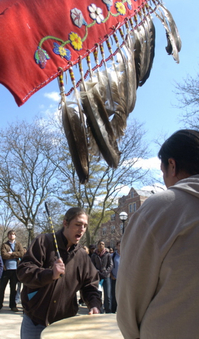University of Michigan begins process of returning Native American remains to tribes
The University of Michigan is moving forward with plans to return the remains of almost 1,400 Native Americans to modern-day tribes, promising a swift and respectful process.
"Now that the Department of the Interior has clarified the rule for transferring culturally unidentifiable human remains, it is important that the university reach out to tribal leaders and facilitate the transfer process," U-M Vice President for Research Stephen Forrest said in a statement released today.

Frank Bartley III, an Odawa Indian and a U-M student, beats the drum and sings with other Native Americans in front of Fleming Hall in Ann Arbor before a U-M regents meeting in this 2008 file photo. The gathering was part of a request to the regents to return Native-American remains.
Ann Arbor News file photo
The remains are part of U-M Museum of Anthropology collections, and no cultural identity has been established for them. The remains of some individuals stored at U-M are more than 3,000 years old.
"The rule change announced last week provides a clear path for the transfer of the human remains in our possession," Forrest said. "We will move down that path in a transparent, swift and respectful manner."
What to do with the vast number of culturally unidentifiable Native American human remains held in museums and other institutions around the country hadn't been fully addressed by the law. Locally, the holding of these remains has been a sore spot between the University of Michigan and some Native American groups.
A March 15 rule change to the Native American Graves Protection and Repatriation Act of 1990 made the process involving the disposition of culturally unidentifiable human remains clear.
Under the rule change, U-M museum officials will alert federally recognized tribes of any culturally unidentified human remains it has that were discovered near areas the tribes historically occupied. Those tribes can ask for the remains to be returned based on the geographic link. A national review committee would settle disputes between tribes. The change will take effect in May.
A letter to pertinent tribes will be sent soon, and U-M officials will consult with officials and traditional religious leaders from those tribes. The remains of the roughly 1,400 individuals in U-M's collections come from archaeological sites in 37 states.
Forrest appointed the 12-member Advisory Committee on Culturally Unidentifiable Human Remains under NAGPRA in the fall. Now, they're preparing to facilitate the new process.
Juliana Keeping covers higher education for AnnArbor.com. Reach her at julianakeeping@annarbor.com or 734-623-2528. Follow Juliana Keeping on Twitter

